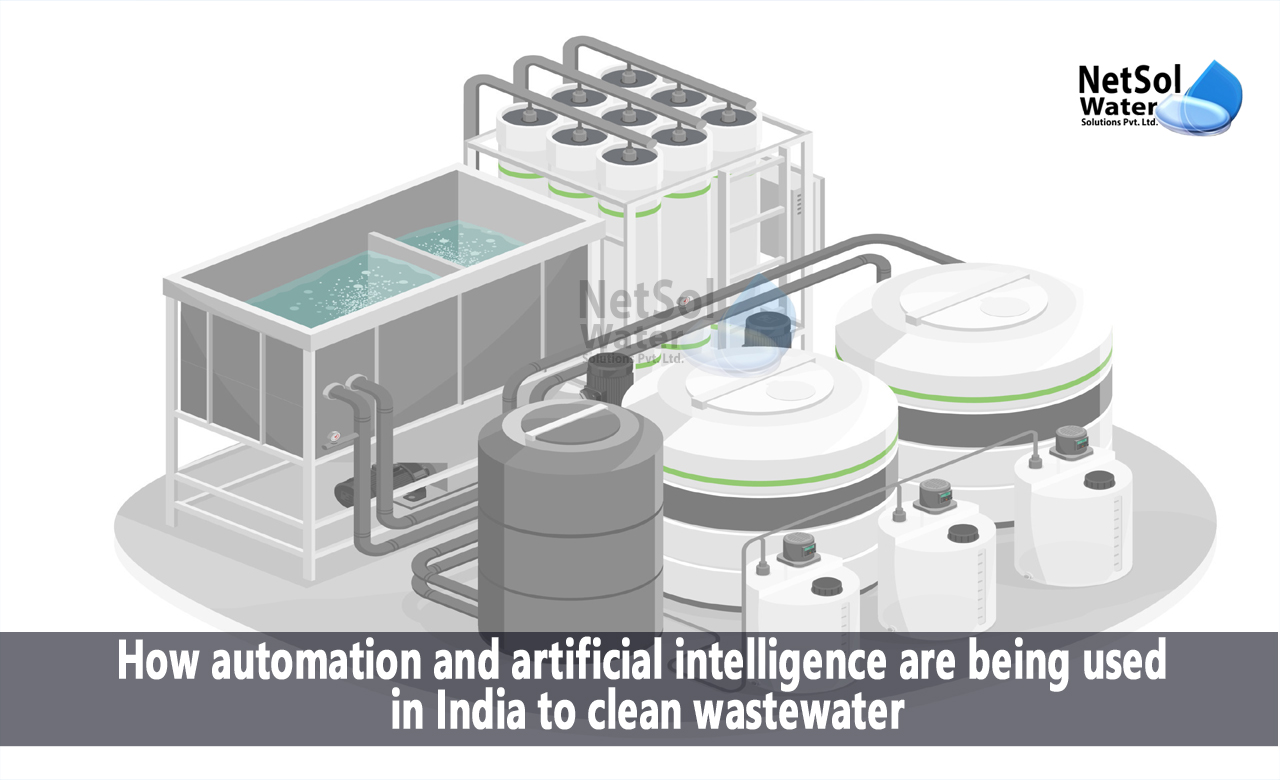How automation and AI are being used in India to clean wastewater?
In India, wastewater treatment is a critical issue as the country struggles with both industrialization and population increase. Conventional wastewater treatment techniques frequently find it difficult to meet the rising demand and environmental standards. India is progressively resorting to cutting-edge technology like automation and artificial intelligence (AI) to improve the sustainability, efficacy, and efficiency of wastewater treatment procedures in order to tackle these problems. We'll look at how automation and artificial intelligence are being used in India to clean wastewater in this blog.
· Real-Time Monitoring and Control
Automation and artificial intelligence are essential for the real-time monitoring and management of wastewater treatment operations. Data from treatment facilities is continuously gathered and analyzed using cutting-edge sensors and AI algorithms. Parameters including pH, dissolved oxygen, turbidity, and chemical concentrations are included in this data. Artificial intelligence (AI) can optimize the treatment process by spotting anomalies, anticipating equipment breakdowns, and making real-time modifications.
· Predictive Upkeep
Predictive maintenance is made possible by integrating automation and AI into wastewater treatment. Artificial Intelligence is able to forecast when maintenance or repairs are required before a breakdown happens by keeping an eye on the functioning of pumps, motors, and other equipment. This proactive strategy increases equipment lifespan, lowers repair costs, and minimizes downtime.
· Optimizing Energy Consumption
One major expense associated with wastewater treatment is energy usage. By modifying the operation of pumps, blowers, and other equipment to fit the treatment demand, automation and artificial intelligence (AI) assist optimize energy utilization. Treatment facilities can lessen their environmental impact and save operating expenses by using less energy during times of reduced demand.
· Increased Productivity
Process control powered by AI and automation can be used to optimize treatment procedures and increase their efficiency. This entails maximizing chemical dosing, aeration, and other essential treatment processes. Treatment facilities can thus continuously meet regulatory requirements and achieve higher rates of pollution removal.
· Water Quality Prediction and Monitoring
AI is able to forecast changes in water quality based on both historical data and current measurements. Artificial intelligence models can predict variations in water quality by examining variables such as meteorological conditions, inflow rates, and influent characteristics. As a result, treatment facilities can proactively modify their operations to continue adhering to environmental regulations.
· Sophisticated data analytics
Handling and interpreting the massive amount of data produced during wastewater treatment can be difficult. Tools for AI-driven data analytics might reveal trends and insights that conventional analysis might miss. Long-term planning and process optimisation can both benefit from these insights.
· Resource Recovery
Recovery of precious resources from wastewater is possible with the help of AI and automation. AI-driven systems, for example, are able to recognize and separate nutrients from wastewater, such as nitrogen and phosphorus, which can then be used again in industrial or agricultural processes. This strategy fosters a circular economy in addition to lowering environmental pollution.
· Sustainability and Its Effect on the Environment
India's dedication to environmental preservation and sustainability is consistent with the use of automation and artificial intelligence in wastewater treatment. The environmental impact of wastewater discharge is reduced by these methods, which also increase treatment efficiency and encourage resource recovery.
Challenges and Considerations
Although there are many advantages to integrating automation and AI, there are also difficulties and things to think about.
Initial Investment: A significant upfront cost is associated with integrating AI and automation in wastewater treatment. Budgetary restrictions may affect many treatment facilities, particularly the smaller ones.
Competent Workforce: AI-driven systems require a competent workforce that can handle these technologies in order to operate and maintain them. Appropriate instruction is crucial.
Data security: It's imperative to safeguard the data that AI systems create and manage. Ensuring privacy and security of data is a constant worry.
Regulatory Compliance: It's critical to follow the changing rules and guidelines pertaining to the application of automation and artificial intelligence in wastewater treatment.
Conclusion:
In India, the introduction of cutting-edge technology like automation and artificial intelligence into wastewater treatment systems is a major step towards environmental protection, sustainability, and efficiency. In line with India's commitment to sustainable development, these technologies provide real-time monitoring, predictive maintenance, energy optimization, and resource recovery. The benefits of automation and artificial intelligence (AI) in wastewater treatment outweigh the hurdles, making them an invaluable addition to India's environmental management initiatives. There is a great deal of room for improvement in wastewater treatment as long as technology keeps developing.
Netsol Water is Greater Noida-based leading water & wastewater treatment plant manufacturer. We are industry's most demanding company based on client review and work quality. We are known as best commercial RO plant manufacturers, industrial RO plant manufacturer, sewage treatment plant manufacturer, Water Softener Plant Manufacturers and effluent treatment plant manufacturers. Apart from this 24x7 customer support is our USP. Call on +91-9650608473, or write us at enquiry@netsolwater.com for any support, inquiry or product-purchase related query.



